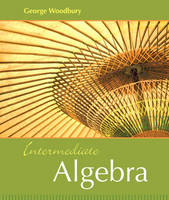
Intermediate Algebra
Pearson (Verlag)
978-0-321-16641-8 (ISBN)
- Titel erscheint in neuer Auflage
- Artikel merken
George Woodbury's Algebra Seriesempowers students for future success in college-level math courses through its early-and-often approach to functions and graphing, integrated study strategies, and quality exercise sets that encourage true conceptual understanding.
* The early-and-often approach to functions helps students prepare for future math courses.
* A Study Skill Strategy is introduced in each chapter opener and then expanded upon throughout the chapter in the Building Your Study Strategy boxes that appear before each exercise set.
* Students can further develop their study skills with the Study Skills Workbook, written by Alan Bass, to accompany the Woodbury texts.
* Vocabulary Exercises begin each section of exercises and check student understanding of the basic vocabulary presented in the preceding section.
George Woodbury earned his bachelor's degree in mathematics from the University of California-Santa Barbara in 1990 and his master's degree in mathematics from California State University-Northridge, in 1994. He currently teaches at College of the Sequoias in Visalia, CA-just outside of Fresno. He has been honored as an instructor by both his students and his colleagues. Aside from teaching and writing, George served as the department chair of the math/engineering division from 1999-2004. George's Elementary and Intermediate Algebra, First Edition, was published in 2006.
1. Review of Real Numbers
1.1 Integers, Opposites, and Absolute Value
1.2 Introduction to Algebra
1.3 Linear Equations and Absolute Value Equations
1.4 Problem Solving: Applications of Linear Equations
1.5 Linear Inequalities and Absolute Value Inequalities
2. Graphing Linear Equations
2.1 The Rectangular Coordinate System; Equations in Two Variables
2.2 Slope of a Line
2.3 Equations of Lines
2.4 Linear Inequalities
2.5 Linear Functions
2.6 Absolute Value Functions
3. Systems of Equations
3.1 Systems of Two Equations in Two Unknowns
3.2 Applications of Systems of Equations
3.3 Systems of Linear Inequalities
3.4 Systems of Three Equations in Three Unknowns
3.5 Using Matrices to Solve Systems of Equations
3.6 Determinants and Cramer's Rule
4. Exponents and Polynomials
4.1 Exponents
4.2 Negative Exponents; Scientific Notation
4.3 Polynomials; Addition, Subtraction, and Multiplication of Polynomials
4.4 An Introduction to Factoring: The Greatest Common Factor; Factoring by Grouping
4.5 Factoring Trinomials of Degree 2
4.6 Factoring Special Binomials
4.7 Factoring Polynomials: A General Strategy
4.8 Solving Quadratic Equations by Factoring
5. Rational Expressions and Equations
5.1 Rational Expressions and Functions
5.2 Multiplication and Division of Rational Expressions
5.3 Addition and Subtraction of Rational Expressions
5.4 Complex Fractions
5.5 Rational Equations
5.6 Applications of Rational Equations
5.7 Division of Polynomials
6. Radical Expressions and Equations
6.1 Square Roots; Radical Notation
6.2 Rational Exponents
6.3 Simplifying, Adding, and Subtracting Radical Expressions
6.4 Multiplying and Dividing Radical Expressions
6.5 Radical Equations and Applications of Radical Equations
6.6 The Complex Numbers
7. Quadratic Equations
7.1 Solving Quadratic Equations by Extracting Square Roots; Completing the Square
7.2 The Quadratic Formula
7.3 Equations that are Quadratic in Form
7.4 Graphing Quadratic Equations and Quadratic Functions
7.5 Applications Using Quadratic Equations
7.6 Quadratic and Rational Inequalities
7.7 Other Functions and Their Graphs
8. Logarithmic and Exponential Functions
8.1 The Algebra of Functions
8.2 Inverse Functions
8.3 Exponential Functions
8.4 Logarithmic Functions
8.5 Properties of Logarithms
8.6 Exponential and Logarithmic Equations
8.7 Applications of Exponential and Logarithmic Functions
8.8 Graphing Exponential and Logarithmic Functions
9. Conic Sections
9.1 Parabolas
9.2 Circles
9.3 Ellipses
9.4 Hyperbolas
9.5 Nonlinear Systems of Equations
10. Sequences, Series, and the Binomial Theorem
10.1 Sequences and Series
10.2 Arithmetic Sequences and Series
10.3 Geometric Sequences and Series
10.4 The Binomial Theorem
Appendices
A. Synthetic Division
B. Sample Solutions to Writing in Mathematics Exercises
| Erscheint lt. Verlag | 1.7.2004 |
|---|---|
| Sprache | englisch |
| Maße | 10 x 10 mm |
| Gewicht | 2034 g |
| Themenwelt | Mathematik / Informatik ► Mathematik ► Algebra |
| ISBN-10 | 0-321-16641-8 / 0321166418 |
| ISBN-13 | 978-0-321-16641-8 / 9780321166418 |
| Zustand | Neuware |
| Informationen gemäß Produktsicherheitsverordnung (GPSR) | |
| Haben Sie eine Frage zum Produkt? |
aus dem Bereich



